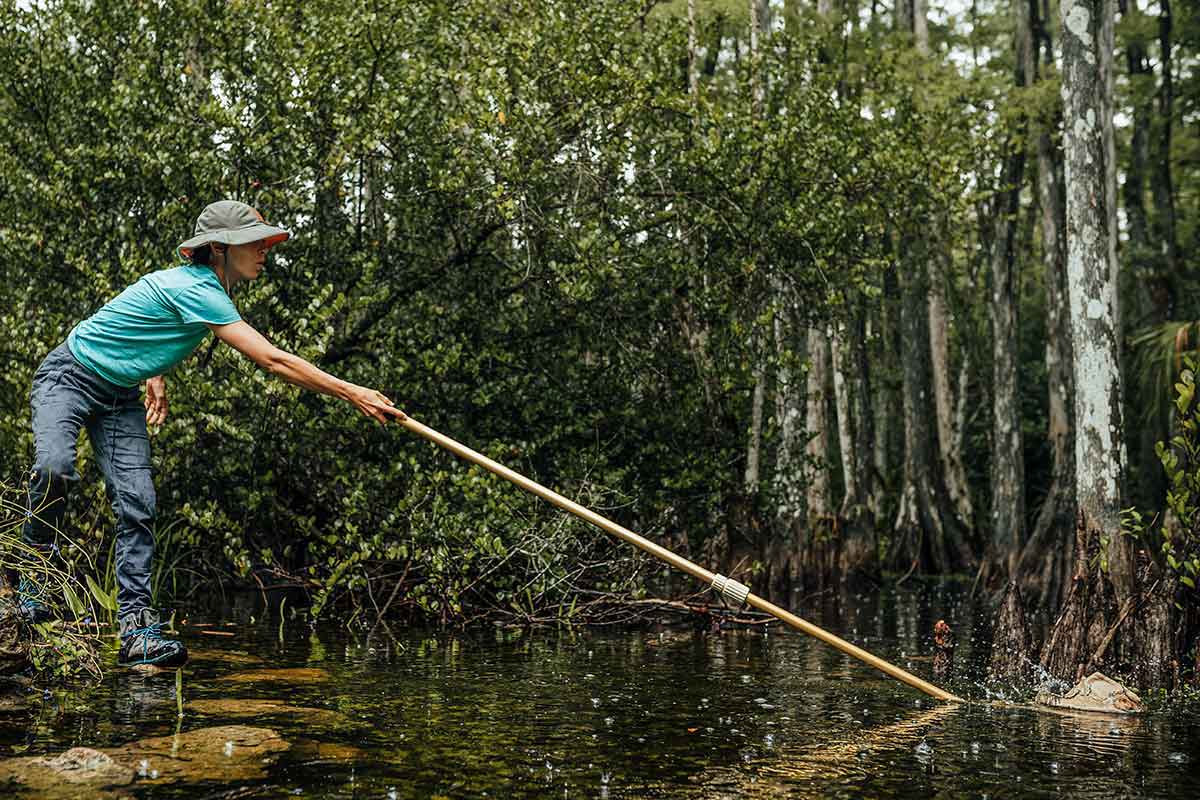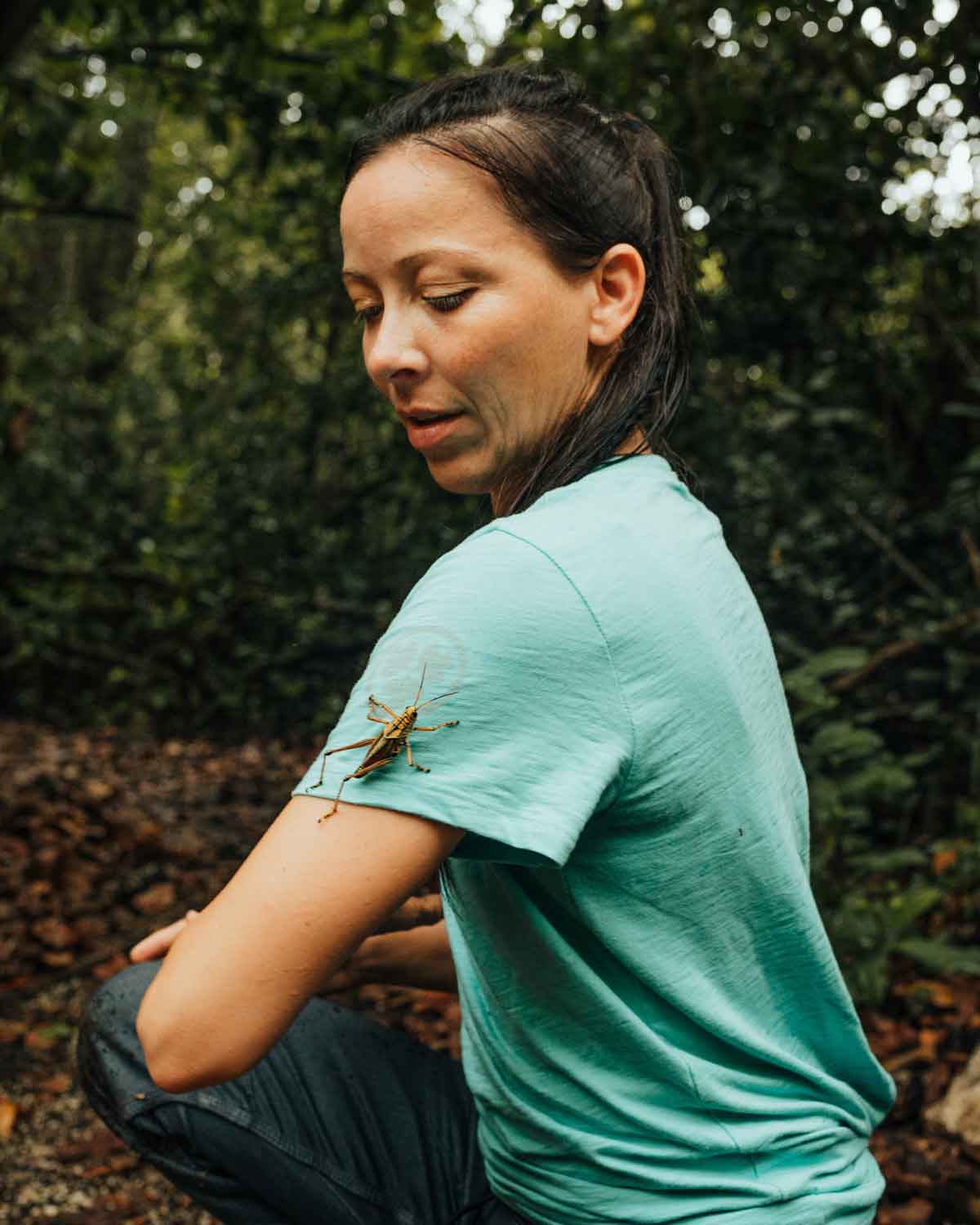 What does a day in your work life look like?
What does a day in your work life look like?As a benthic ecologist, I study organisms that live on the bottom of a water body. I’ve spent most of my career in freshwater specializing in aquatic insects, but I’ve started to work in estuaries and am learning about saltwater invertebrates for the first time in my life, which is exciting. My time is usually split between fieldwork, lab work, and data analysis/writing.
Wow! Such a specific field must mean a lot of schooling.
It took 16 years to go all the way through college: Bachelor’s, Master’s, and PhD. You don’t have to be smart, you just have to be stubborn–anyone can get a degree (or whatever your goal is). I taught for three years at a college outside of Chattanooga, TN in a forestry, wildlife,and fisheries program before starting the ORISE (Oak Ridge Institute for Science and Education) postdoc last December with the EPA (Environmental Protection Agency) down in Florida. A postdoc is kind of like an internship after you earn a PhD. It’s an opportunity to further train in your field, and it goes on your resume. It may sound like a lot, but I became completely immersed in biology a long time ago and it’s a huge part of my life outside of school or work. When those lines gray, it’s not hard to push yourself far.
What made you start down the ecology career path?
I didn’t set out to be an entomologist (bug biologist), but the more you learn about something, the more you come to care about it. I thought I would end up working with big cats or something like that, but I followed an opportunity to join the mosquito surveillance program for West Nile Virus. The next thing I knew I was working in the benthic ecology lab at my university. It has taken me on a journey across three continents and seven countries, working in some of the most pristine and polluted rivers in the world. I’ve had opportunities to work with fish, salamanders, and even wrote a paper on crocodilians (the biology order of reptiles, including crocodiles), but I keep coming back to aquatic invertebrates.
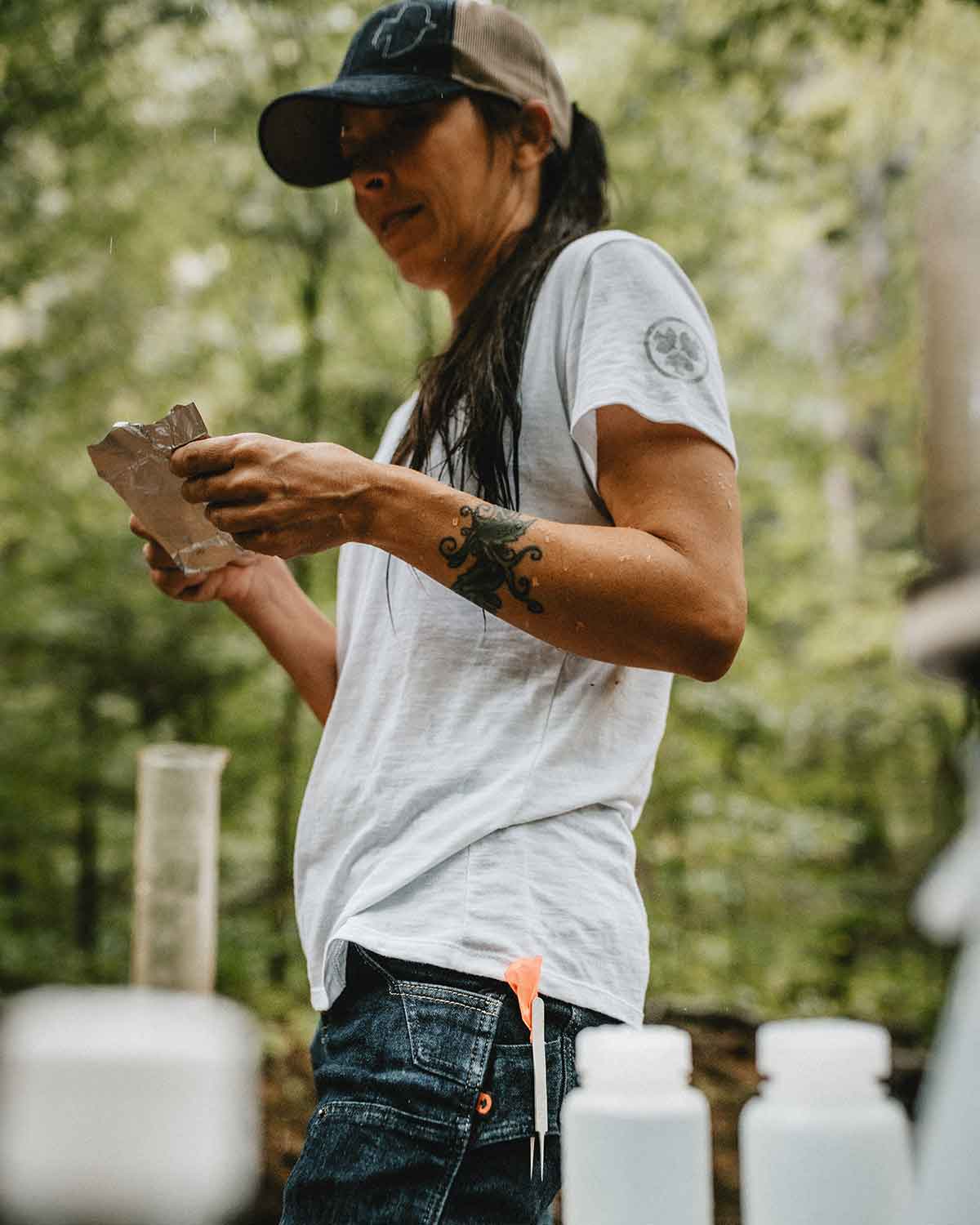 What did you want to be when you were growing up, or a little kid?
What did you want to be when you were growing up, or a little kid?I’ve wanted to work with animals as far back as I can remember. At different times I wanted to be a veterinarian or aquarist but I’ve always wanted to be involved with animals.
What do you have to sacrifice to be good at what you do?
I’ve had to sacrifice a lot of nights and weekends, but it's often something I want to be doing, so it doesn’t always feel like a sacrifice. I will say that you have to be flexible in where you are willing to live, and what you are willing to do because you may not find what you want where you want. I applied for so many jobs in and around Atlanta to be closer to my boyfriend, but ended up taking a position five hours away in Pensacola. I am loving Florida, and am so grateful for my position with the EPA, but long distance is hard. We make it work between the mountains and the sea, but I look forward to living with him again!
What are you great at, and what do you suck at?
Anxiety is my superpower and my biggest weakness. It's something I’ve dealt with since high school. Part of what helps me be successful, whether academics or sports, is my anxiety. It manifests as perfectionism, planning, and long hours. I haven’t tamed the dragon though, and it roars through imposter syndrome and disorder at times, leading to unanswered messages and missing important things on my schedule when it gets out of control. I’ve spent a lot of time working on coping skills and better habits, but COVID has definitely been difficult.
Anxiety is my superpower and my biggest weakness. It's something I’ve dealt with since high school. Part of what helps me be successful, whether academics or sports, is my anxiety. It manifests as perfectionism, planning, and long hours. I haven’t tamed the dragon though, and it roars through imposter syndrome and disorder at times, leading to unanswered messages and missing important things on my schedule when it gets out of control. I’ve spent a lot of time working on coping skills and better habits, but COVID has definitely been difficult.
Dr. Jenny Paul's Spotify Podcast
What scares a woman who has faced down crocodiles?
I have a genuine fear of food poisoning and can’t eat food past the expiration date. Maybe it's from the years teaching in the microbiology lab, but questionable food preparedness or storage is a no-go for me. I can handle tarantulas and rattlesnakes but am crippled by the thought of catching a stomach bug.
What do you want people to know about being a woman in ecology?
It took me a long time to embrace my feminine self because I thought that it was a weakness or something. I scoffed at pink, and tried to emulate the boys, but there is nothing strong about denying any part of myself. As a field biologist, it can be easy to fall into the usual game of trying to fit in with the boys so you're not perceived as weak, but there is nothing weak about being a woman—so own it, sister.
I have a genuine fear of food poisoning and can’t eat food past the expiration date. Maybe it's from the years teaching in the microbiology lab, but questionable food preparedness or storage is a no-go for me. I can handle tarantulas and rattlesnakes but am crippled by the thought of catching a stomach bug.
What do you want people to know about being a woman in ecology?
It took me a long time to embrace my feminine self because I thought that it was a weakness or something. I scoffed at pink, and tried to emulate the boys, but there is nothing strong about denying any part of myself. As a field biologist, it can be easy to fall into the usual game of trying to fit in with the boys so you're not perceived as weak, but there is nothing weak about being a woman—so own it, sister.
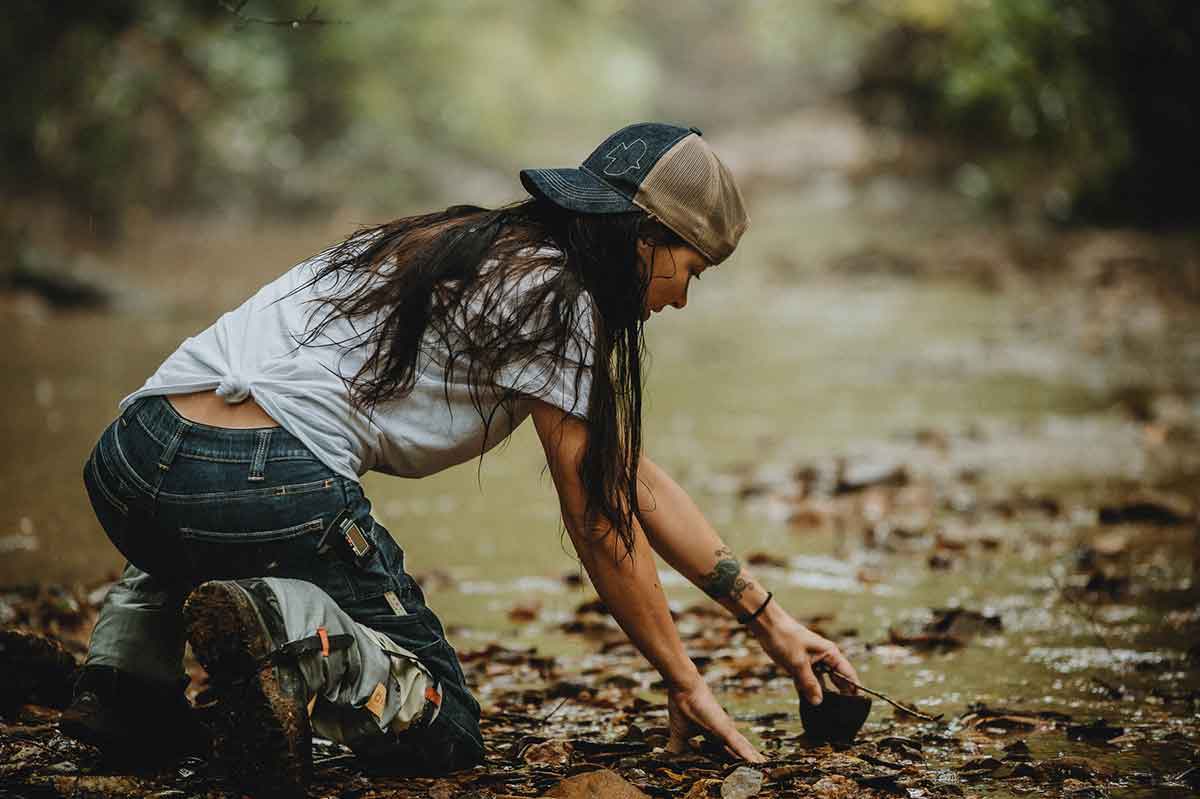
What are you doing when you’re not working hard?
Will my advisor see this? I’m ALWAYS working hard ;)
…No but really, I work my tail off! Equally important to my happiness is time outdoors adventuring. I’m an avid whitewater kayaker and rock climber, but there isn’t much of that in Florida so I’ve started surfing and snorkeling the springs.
Tell us something surprising about you.
I don’t think it's surprising if you know me well, but I’ve been a vegetarian for almost 20 years, and also can clean fish or crudely field dress a deer if I absolutely had to. You want me on your zombie survival team!
How do you encourage other women to start doing what you do?
It was easier when I was teaching at the community college where I could actually mentor students, but now I try to motivate other women through social media. I’ve taken a few photography webinars and am trying to share what I do more publicly. Visual media is such a powerful communication tool and I’ve been able to engage with women early in their career from states or countries away.
Who’s a role model who helped you in your journey to where you are?
When I was an undergrad at the University of North Texas, Roxana Hughes gave me an opportunity to work with her in the microbiology lab on campus. At the time, I was really struggling waiting tables trying to pay my way through college, and I would have customers tell me about how they had wanted to be a marine biologist when they were growing up but became an accountant, or whatever. I never wanted that to be my story, and when Roxana took me on as a student worker, and started believing in me, it was the spark I needed to take off. She was always one of my biggest supporters through everything and unfortunately passed away earlier this year way too young. By chance, her family in Texas flew her ashes to Pensacola, and laid her to rest looking out into the water at a spot I fell in love with when I first moved here.
Will my advisor see this? I’m ALWAYS working hard ;)
…No but really, I work my tail off! Equally important to my happiness is time outdoors adventuring. I’m an avid whitewater kayaker and rock climber, but there isn’t much of that in Florida so I’ve started surfing and snorkeling the springs.
Tell us something surprising about you.
I don’t think it's surprising if you know me well, but I’ve been a vegetarian for almost 20 years, and also can clean fish or crudely field dress a deer if I absolutely had to. You want me on your zombie survival team!
How do you encourage other women to start doing what you do?
It was easier when I was teaching at the community college where I could actually mentor students, but now I try to motivate other women through social media. I’ve taken a few photography webinars and am trying to share what I do more publicly. Visual media is such a powerful communication tool and I’ve been able to engage with women early in their career from states or countries away.
Who’s a role model who helped you in your journey to where you are?
When I was an undergrad at the University of North Texas, Roxana Hughes gave me an opportunity to work with her in the microbiology lab on campus. At the time, I was really struggling waiting tables trying to pay my way through college, and I would have customers tell me about how they had wanted to be a marine biologist when they were growing up but became an accountant, or whatever. I never wanted that to be my story, and when Roxana took me on as a student worker, and started believing in me, it was the spark I needed to take off. She was always one of my biggest supporters through everything and unfortunately passed away earlier this year way too young. By chance, her family in Texas flew her ashes to Pensacola, and laid her to rest looking out into the water at a spot I fell in love with when I first moved here.
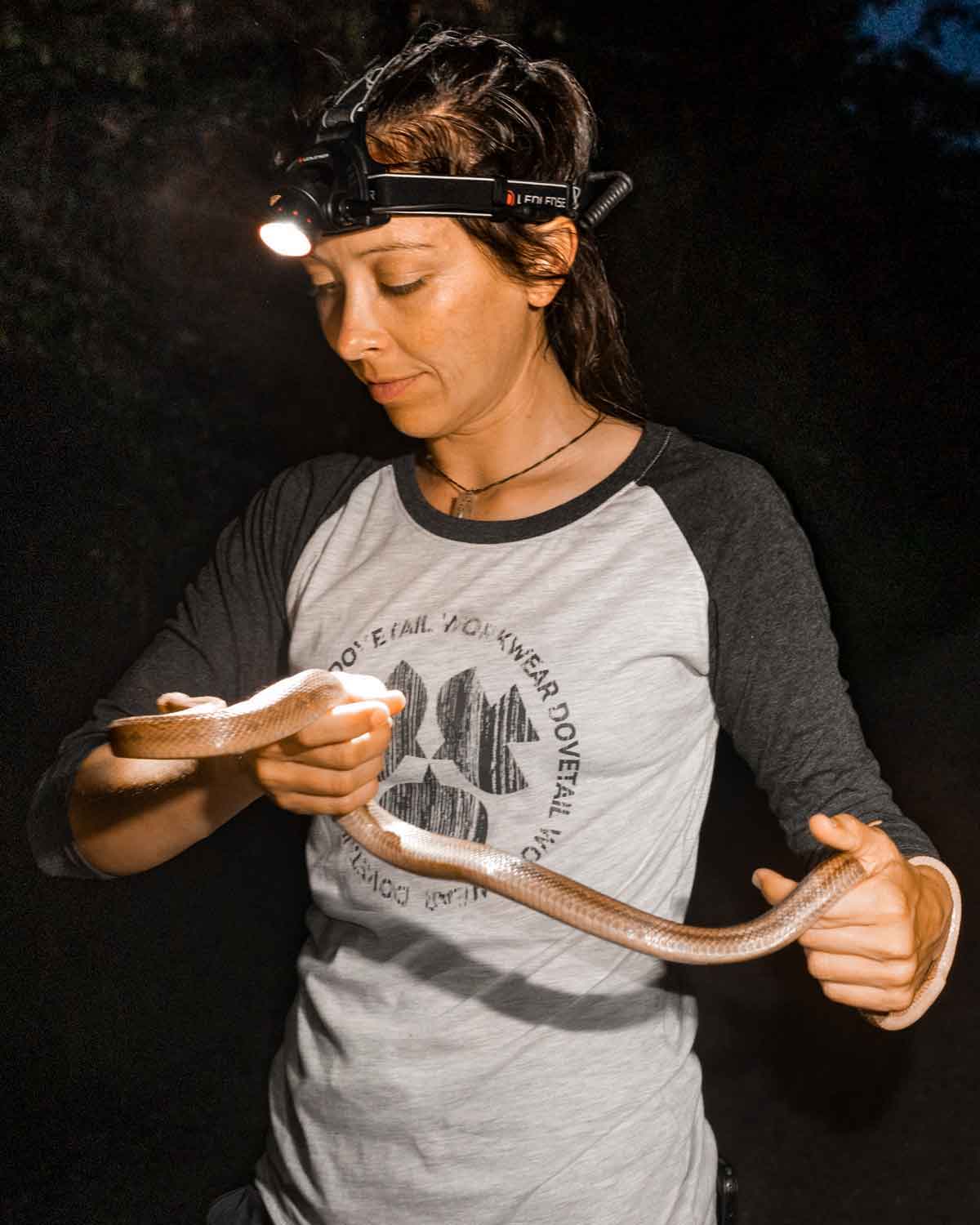 If you could give your 20-year-old-self advice, what would it be?
If you could give your 20-year-old-self advice, what would it be?“Hey 20-year-old Jenny: learn to love the process, not the products. You’ll get to where you’re going, so enjoy the ride and stop stressing! Much love.”
What does workwear designed for women mean to you?
Let's be real: women are not smaller men. Countless times, I have had to wear men’s clothes that don’t fit well, and therefore don’t work right,which is not just uncomfortable, but can be dangerous in the field. Having durability and mobility is critical when moving around harsh environments, and Dovetail is incredible! There is always a pocket where I need it. I feel like a jungle cat when I’m moving through the trees. It’s apparent that the clothing is designed by women because you can tell a lot of thought went into every garment in subtle ways a man may not consider.
Do you have anything you want people to check out?
I want anyone reading this to stop immediately and go check out Help the Hell Bender. There’s a lot we can do as individuals to help these beautiful beasts! I also encourage everyone that cares about water, by either playing in it or drinking in it, to check out the How’s My Waterway portal by the EPA.
Follow Dr. Jenny on Instagram. Dr. Paul’s pronouns are she/her.
She has also posted her papers on ResearchGate.
All photos by Nathalie DuPré.
